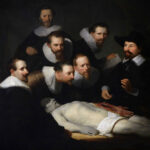“Winning the Peace.” Part reflection on C.S. Lewis’s “Learning in War-Time” and part a response to Alan Jacobs’s The Year of Our Lord 1943, Christopher Beha’s Harper’s essay is an excellent defense of “a society in which we all spend a little less time thinking and talking about politics.”
“Why Wendell Berry is Still Not Going to Buy a Computer.” Travis Kitchens interviews Berry about his reasons for saying “a tiny little no” to computers.
“A Connecticut Yankee and the Failure of Progressivism.” In a thoughtful essay for The Imaginative Conservative, Mark Malvasi draws some important lessons from Twain’s classic. Mavlasi’s claim that Twain didn’t realize what he was doing, and that he intended “to endorse contemporary American society” seems weak; I think Twain knew exactly what he was doing. Nevertheless, this is a novel today’s techno-utopians need to read and reckon with: “No writer so early recognized and so credibly exposed the dangerous inadequacies concealed in the Progressive world view than did Mark Twain in his sardonic novel A Connecticut Yankee in King Arthur’s Court.”
“Half of England is Owned by Less than 1% of the Population.” The Guardian’s Rob Evans reports on the findings of Guy Shrubsole regarding English land ownership. It’s not exactly widely distributed.
“Where Our New World Begins: Politics, Power, and the Green New Deal.” Kevin Baker’s long essay in Harper’s traces the mistaken farming practices that caused the dust storms of the 1930s and were addressed by the Soil Conservation Service and other aspects of the New Deal. The populist parts of this essay are pretty good (though I think his Contrast between the “original Populists” of the 1930s with “the vapid mobs that fill Trump rallies” misses some real historical continuities, and supporters of William Jennings Bryan might be surprised to discover they weren’t populists), but the elitist condescension for all who might disagree with his policy prescriptions aren’t. Nonetheless, it’s a thoughtful essay very much worth reading. (Recommended by John de Graaf.)
“Who Will Rescue America’s Farmers?” Jake Meador responds to the agricultural proposals that Senator Elizabeth Warren recently put forward. He finds much to commend but hopes that conservatives will also contribute to solving America’s systemic agricultural problems: “We may not need progressive policies. But we do need a humane scale for agriculture—and that means we will need, somehow, to grow the number of small, family farms in America.”
“Vasudhaiva Kutumbakam.” Vandana Shiva speaks out against the removal of the adivasis, the indigenous residents inhabiting many of India’s forests: “The enclosure of the commons is being facilitated by destroying the integrity of community rights, and reducing them to adhoc rights of individuals concocted by a corrupt bureaucracy in connivance with greedy criminal corporations.”
“Resurrection Hope For Notre Dame.” Medieval historian Beth Allison Barr writes about the fire at Notre Dame this week: “Holy Week is a tragic time to lose the Cathedral of Notre Dame. But Holy Week is also the perfect time to hope for resurrection.”
“The Overstory by Richard Powers Wins Pulitzer Prize for Fiction.” Ron Charles writes about the sprawling, arboreal novel that won the Pulitzer Prize.
“Why I Became Muslim.” Dissatisfied with the “tepid, half-believing Anglicanism” of his upbringing, Jacob Williams writes for First Things about his conversion to Islam.
”The Cataclysmic Break That (Maybe) Occurred in 1950.” Does the Anthropocene exist? If so, when did it “begin”? Robinson Meyer reports for The Atlantic on the debate.
“Five Lies Our Culture Tells.” David Brooks rejects 5 cultural myths and gives some good advice. Here’s a sample: “In reality, the people who live best tie themselves down. They don’t ask: What cool thing can I do next? They ask: What is my responsibility here? They respond to some problem or get called out of themselves by a deep love.”
“How Southern Baptists Are Grappling With Artificial Intelligence.” Ruth Graham describes a statement that the Ethics and Religious Liberty Commission put out regarding AI and Christian ethics.
“Unfree Radical: Review of My Father Left Me Ireland By Michael Brendan Dougherty.” Barton Swaim reviews Dougherty’s memoir: “In the end, My Father Left Me Ireland is a protest against the soulless atomization of modern liberal democracies and a cri de cœur for a more connected, traditional way of life.”






